Key takeaways
- Frege’s Principle of Compositionality asserts that the meaning of a complex expression is derived entirely from the meanings of its parts and their arrangement, enhancing our understanding of language and logic.
- This principle aids in breaking down ambiguous sentences and has practical applications in fields like philosophy and computer science, promoting clarity and precision in communication.
- Learning compositionality requires patience and a willingness to embrace complexity, as some expressions resist neat breakdowns, fostering deeper insights into language.
- Incorporating Frege’s Principle in philosophy education transforms student engagement, encouraging active interpretation and critical thinking, making complex texts more accessible.
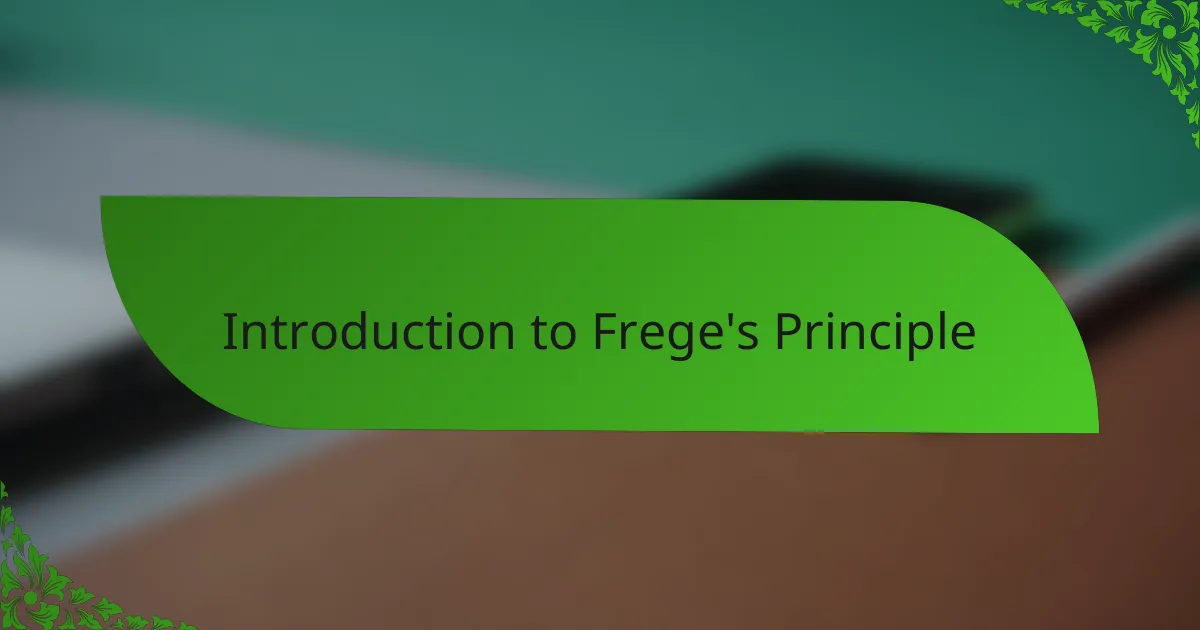
Introduction to Frege’s Principle
When I first encountered Frege’s Principle of Compositionality, I was struck by its elegant simplicity: the meaning of a complex expression is determined entirely by the meanings of its parts and how they are combined. This idea seemed obvious at first glance, but as I reflected, I realized how profound and foundational it is for both language and logic. Have you ever paused to think about how effortlessly we understand new sentences by piecing together familiar words?
Diving deeper, I found that Frege’s insight challenges us to appreciate language as a structured system where meaning isn’t just scattered but systematically built. For me, this shifted the way I approach interpreting texts—no longer just as a collection of unrelated phrases, but as carefully assembled wholes that convey precise meanings. It’s a bit like solving a puzzle where each piece’s place is crucial to revealing the bigger picture.
What really resonated was how this principle connects to everyday communication and philosophical inquiry alike. I often catch myself wondering how different things would be if meaning wasn’t compositional—would language still work as smoothly? Experiencing this principle firsthand has truly deepened my appreciation for the subtle mechanics behind our spoken and written words.
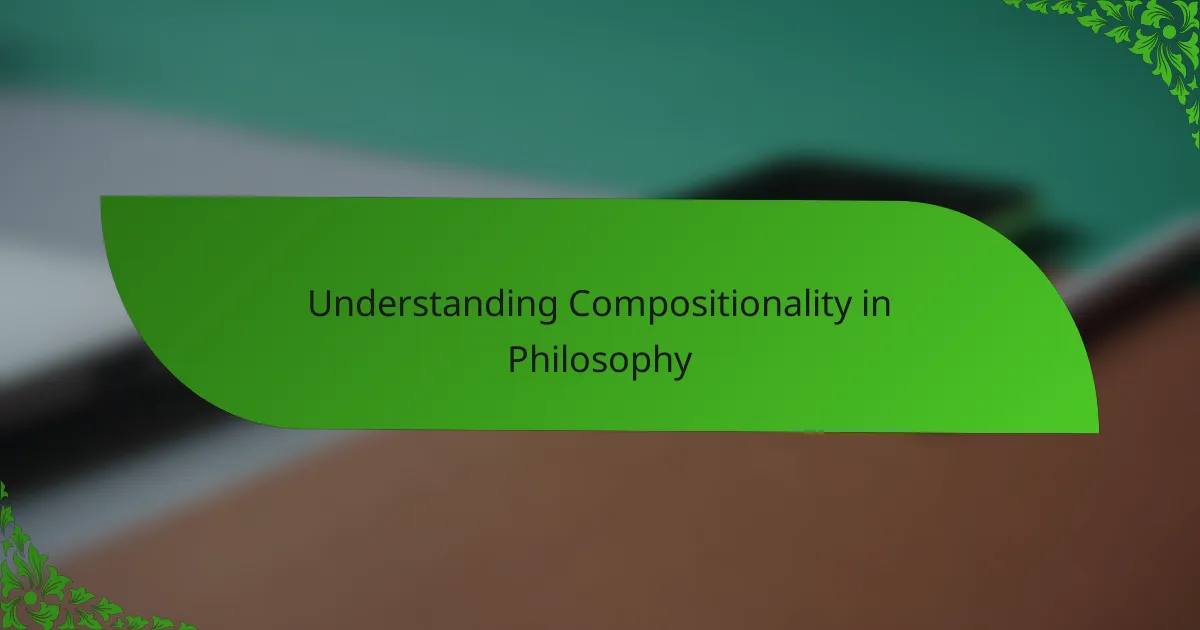
Understanding Compositionality in Philosophy
Understanding compositionality in philosophy felt like unlocking a door to a new way of thinking about meaning. I remember puzzling over a complex sentence and suddenly realizing that each word’s role wasn’t random—it was part of an intricate blueprint. That moment made me appreciate how our minds naturally follow this blueprint without conscious effort.
Have you ever thought about how you can grasp unfamiliar sentences so quickly? It’s because compositionality allows us to break down meanings into manageable parts, then recombine them seamlessly. In philosophy, this clarity is invaluable—it gives structure to arguments and helps avoid misunderstandings that could otherwise derail a discussion.
From my experience, embracing compositionality has been like gaining a tool to dissect language with precision. It’s not just abstract theory anymore; it’s a practical lens I use daily, whether I’m reading philosophy or just chatting with friends. It’s amazing how this principle quietly governs so much of our understanding without us even noticing.
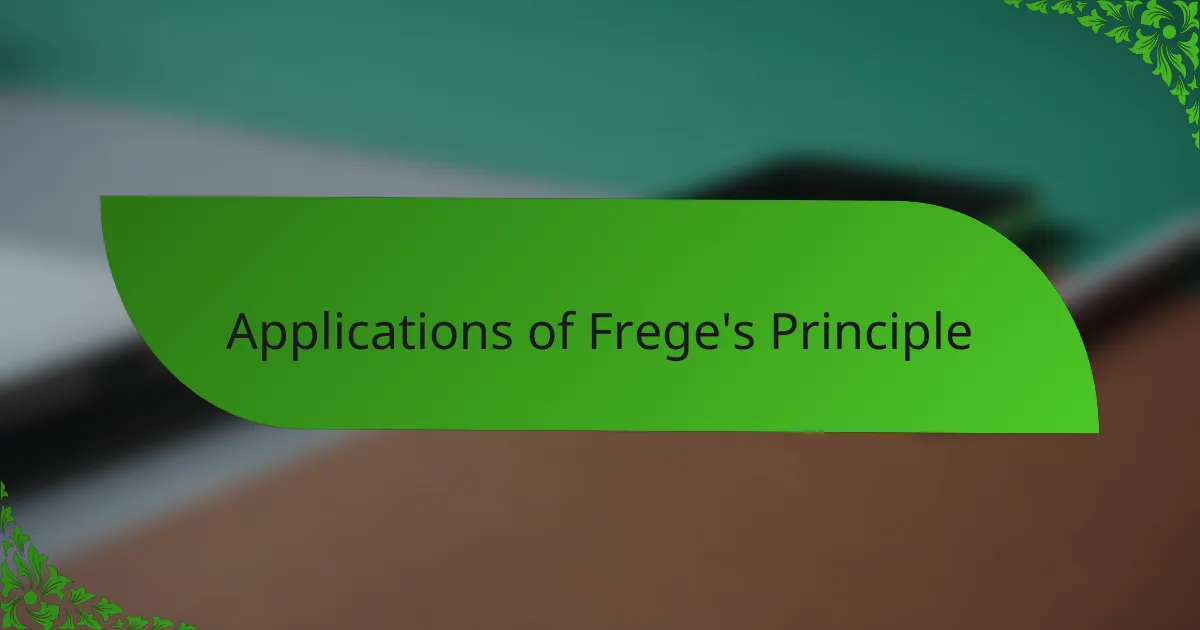
Applications of Frege’s Principle
One of the most striking applications of Frege’s Principle is in analyzing ambiguous sentences. I remember grappling with a sentence that seemed to mean two different things depending on how its parts were combined. Realizing that the meaning hinges on the structure gave me a clearer way to untangle such ambiguities—showing that understanding compositionality isn’t just academic, but deeply practical.
Have you noticed how programming languages use similar ideas? They rely heavily on breaking down commands into smaller parts to avoid errors. This connection surprised me and made me appreciate Frege’s Principle beyond philosophy—it’s foundational in computer science, too. Seeing this crossover made the principle feel even more alive and relevant.
Moreover, I’ve found Frege’s insight crucial when interpreting complex philosophical arguments. It’s easy to get lost in jargon or dense phrasing, but by focusing on how meanings compose, I can reconstruct arguments piece by piece. This approach transformed my reading experience, turning confusion into clarity and making difficult texts feel accessible.
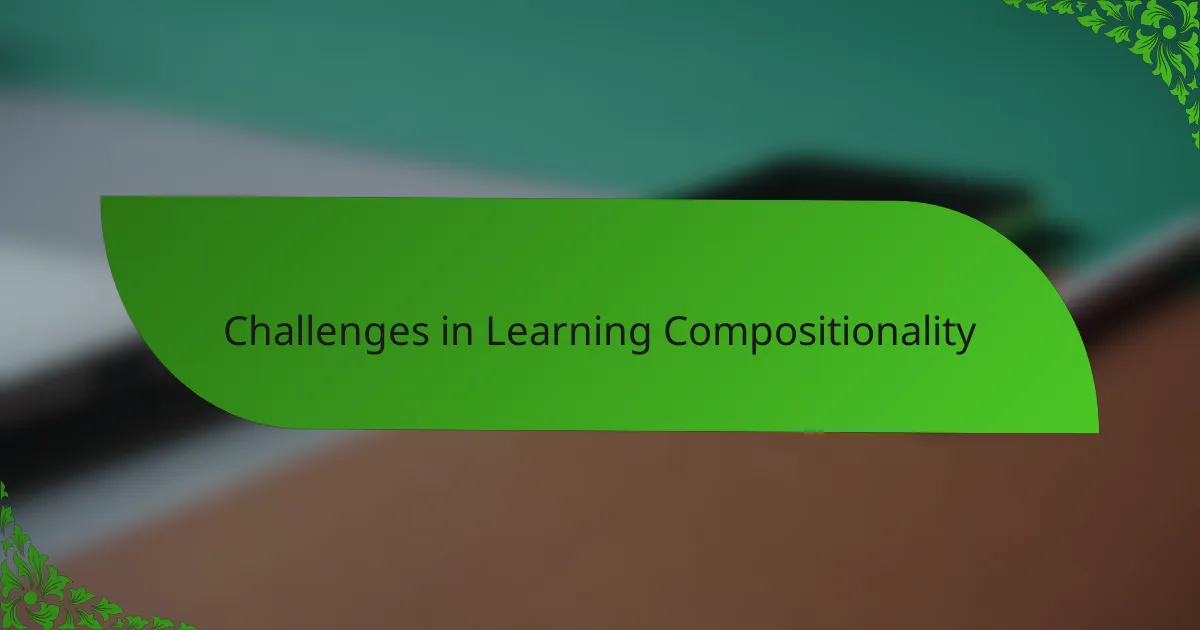
Challenges in Learning Compositionality
Learning compositionality wasn’t as straightforward as I initially thought. I often found myself stuck when trying to parse sentences where the meaning didn’t neatly add up from the parts. Have you ever felt that frustration—like something just doesn’t click, even when the pieces seem clear?
One challenge I faced was dealing with expressions that seemed context-dependent or idiomatic, where compositionality felt strained. It was confusing to reconcile the principle with phrases whose meanings aren’t just the sum of their words. This made me question whether compositionality applies universally or if exceptions exist.
Despite these hurdles, grappling with them deepened my understanding. It made me realize that mastering compositionality requires patience and a willingness to embrace complexity, not just neat, textbook examples. Do you think learning something so foundational should come without bumps? From my experience, those bumps are where the real learning happens.
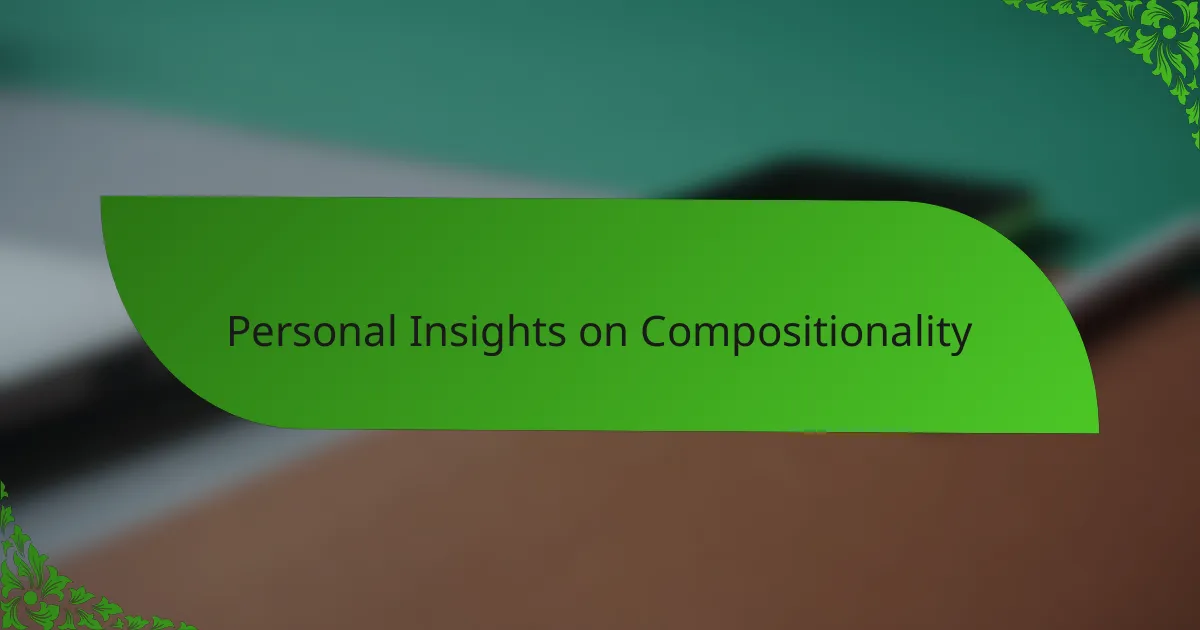
Personal Insights on Compositionality
Sometimes, I catch myself marveling at how effortlessly we build meanings layer by layer, almost like an invisible craftsperson assembling a delicate sculpture. It’s fascinating to realize that this process isn’t just logical but deeply intuitive—something my mind seems to do naturally, even when I’m not consciously aware of it. Have you ever noticed how meaning just “clicks” into place when you hear a new phrase for the first time? That’s compositionality at work, quietly shaping our understanding.
Reflecting on my own experience, I realize that compositionality also reveals the limits of language—it shows me where meanings falter or twist when parts don’t fit as expected. There have been moments when I felt that sudden discomfort, realizing that some expressions resist neat breakdowns. Those moments made me question how rigid the principle really is, yet they also encouraged me to embrace ambiguity rather than shy away from it.
What I appreciate most about Frege’s Principle is how it invites a balancing act between clarity and complexity. It’s like having a compass guiding me through the maze of meaning, but one that allows detours and discoveries along the way. This personal insight makes engaging with language feel less like decoding a puzzle and more like joining a conversation that evolves with every new piece added.

Practical Lessons from My Experience
One practical lesson I’ve learned is to slow down and really pay attention to how each word and phrase contributes to the whole sentence’s meaning. Early on, I rushed through interpretations, assuming I understood right away, but Frege’s Principle taught me that meaning builds piece by piece. Have you ever caught yourself misreading something simple because you overlooked how parts fit together? I certainly have, and re-examining those moments changed how I approach language.
Another insight from my experience is that this principle isn’t just academic jargon—it genuinely sharpens your critical thinking. When faced with complex arguments, I now break them down systematically, which makes discussions clearer and more productive. It feels empowering to dissect meaning so precisely, like having a mental toolkit that turns confusion into clarity.
Lastly, embracing Frege’s Principle showed me that patience is key. Sometimes, meanings don’t snap into place immediately, and that’s okay. I remember sitting with puzzling sentences that initially frustrated me, but giving myself space to untangle their components paid off. Doesn’t learning always happen in those challenging pauses? For me, these moments were the real turning points in understanding compositionality deeply.
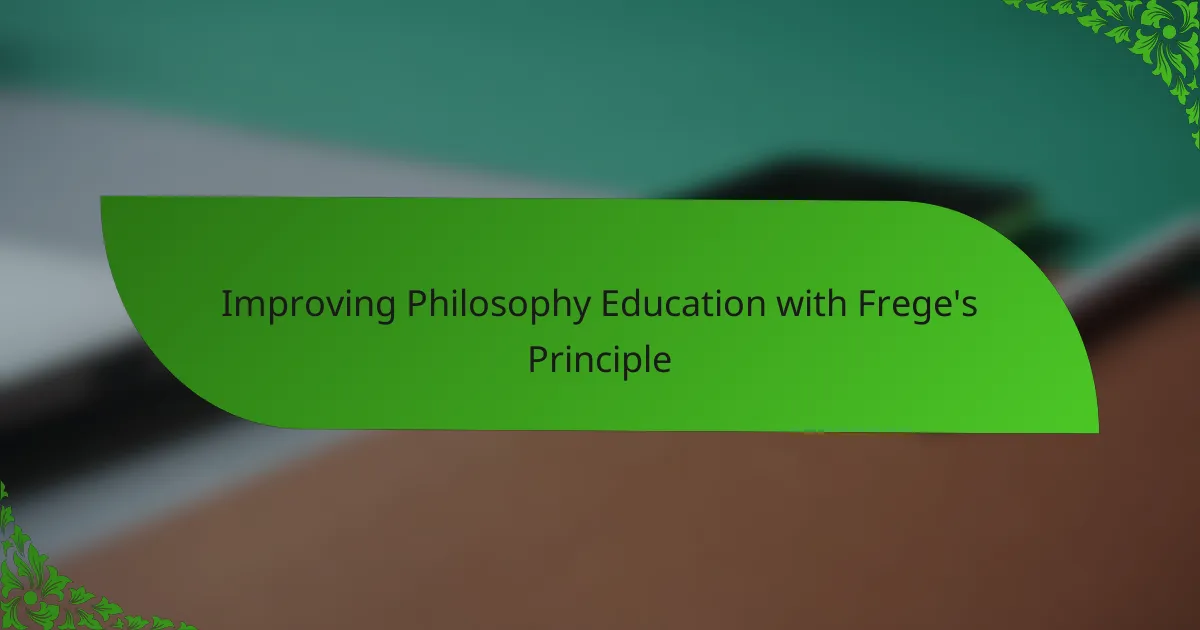
Improving Philosophy Education with Frege’s Principle
Frege’s Principle offers a powerful way to improve philosophy education by transforming how students engage with complex texts. I’ve noticed that when learners grasp that meanings build up from parts, they stop feeling overwhelmed by dense arguments and instead start breaking them down confidently. Have you ever been stuck on a tough paragraph and felt relief just by parsing it into smaller, manageable ideas? This approach makes philosophy feel less like an impenetrable maze and more like a meaningful conversation.
What really stands out to me is how incorporating Frege’s Principle encourages a mindset shift—from passive reading to active interpretation. In my experience, students become more curious about the structure behind the words, asking “Why does this part mean this?” rather than just accepting statements at face value. That curiosity sparks deeper understanding because it moves learning beyond memorizing definitions toward exploring relationships between ideas.
Finally, applying this principle in teaching sharpens critical thinking skills in a way that feels natural, not forced. I often reflect on moments when breaking down arguments into compositional parts clarified confusion for me, and I realize how valuable that skill is for any learner. Isn’t it encouraging to know that philosophy education can become more accessible and dynamic simply by focusing on how meanings compose? For me, Frege’s insight offers an inviting path to unlock the complexities of philosophical inquiry.